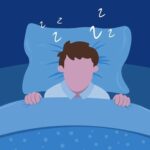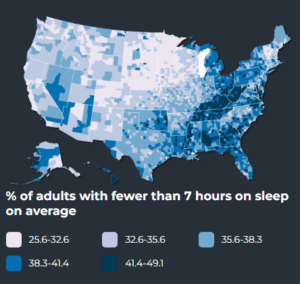March 9th to the 15th is Sleep Awareness Week!
The National Sleep Foundation launched Sleep Awareness Week in 1988 during daylight savings when Americans lose an hour of sleep (1). As a result of this, the foundation wanted to provide information and advice on how your quality of sleep affects your health and overall well-being and why people should prioritize sleep.
In a Health Culture Foundation sleep study, 35-50% of adults worldwide stated that they experience unhealthy sleep (2). Numerous factors can cause unhealthy sleep such as difficulties staying or falling asleep, poor bedtime habits, health conditions, and sleep disorders (3). However, there are a variety of ways to help improve upon these habits.
Whether you’re working out on the field or sitting at a desk, it’s recommended to monitor your eating throughout the day, making sure to eat healthy and balanced meals when you’re hungry and to avoid skipping out on any meals. Also, it is a good habit to not to eat right before you go to bed to avoid indigestion, as it can cause tossing and turning.
For workers who are out at project sites, you may experience irregular work hours. If a consistent work schedule is difficult to achieve due to the nature of your work, do your best to find a sleep routine that works for your schedule. Irregular work hours “can throw off our internal clocks, making it hard to settle into a [regular] sleep routine” (4).
For office workers, screen time and a lack of physical activity are the two main instigators that create bad sleeping habits. The Healthline, a health and wellness editorial, states that for every 20 minutes spent looking at a screen, one should look at something that is 20 feet away for 20 seconds to help reset your eyes and reduce eye straining (5). To help keep your body active, it is good to get up from your desk, stretch, and walk around throughout the workday as burning energy can help you sleep better at night.
 The National Sleep Foundation’s goal is to promote safe and healthy sleeping habits for all to follow as well as bring attention to how burdensome sleeping problems can be for people who experience them (6).
The National Sleep Foundation’s goal is to promote safe and healthy sleeping habits for all to follow as well as bring attention to how burdensome sleeping problems can be for people who experience them (6).
ERC hopes our team, partners, and clients are getting healthy sleep every night!
______________________________________________________________________________________________________________________
More Sleeping Tips from the National Sleep Foundation:
- Create a bedtime routine that is relaxing to help you wind down.
- Set the temperature in your bedroom to be between 60-67 degrees Fahrenheit. At this temperature, your core body temperature will reduce and begin releasing melatonin.
- Keep your bedroom dark by using curtains or a sleep mask.
- Avoid consuming caffeinated products in the late afternoon and early evening.
______________________________________________________________________________________________________________________
Sources:
- Sleep Awareness Week from National Today
- Sleep Awareness Month
- What Causes Restless Sleep from the Sleep Foundation
- Why Your Workday Routine Might Be Keeping You Up at Night from SHRM
- How Does the 20-20-20 Rule Prevent Eye Strain? from the Healthline
- Sleep Awareness Week from National Today
- 10 Tips for a Better Night’s Sleep from the National Sleep Foundation

